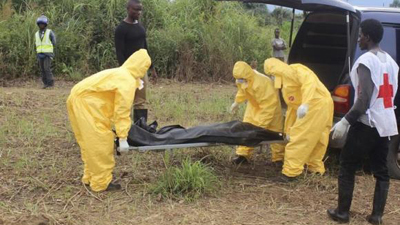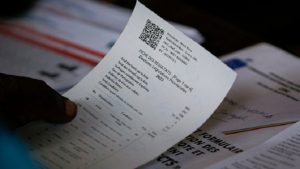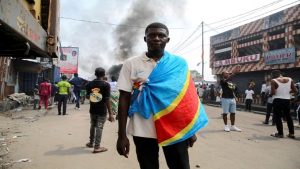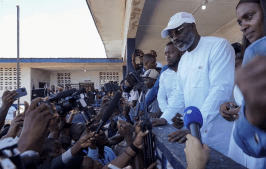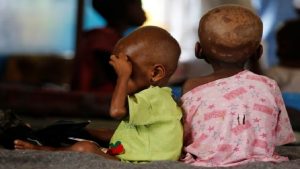When medics tried to reach Ebola patients in a village in eastern Democratic Republic of Congo during a recent surge in violence, they were blocked by men wielding machetes and axes.
Worried about being kidnapped, they turned back, the latest in a series of setbacks in their attempts to contain the central African country’s worst outbreak of the deadly virus.
As fighting has worsened between rival militia seeking control of land and natural resources, vaccinations and vital treatments have increasingly been delayed and Ebola has spread.
The situation has become so dangerous in eastern Congo that humanitarian workers were temporarily evacuated last month from their base in the town of Beni in the North Kivu region close to Rwanda and Uganda.
With the vast country of more than 80 million people also suffering from political instability and facing a refugee crisis, World Health Organization experts see it as one of the most complex public health challenges in recent history.
“Sometimes in the field we hear bullets flying left to right and we tell ourselves maybe it is going to hit one of us,” said Mimi Kambere, emergency response coordinator for nonprofit group Oxfam, whose team was confronted by the men with machetes.
“Sometimes the insecurity pushes us not to respond to calls, and not to go into certain areas for days,” she told Reuters in Goma, the town on the northern shores of Lake Kivu to which she and other health workers were evacuated on November 17.
Congo’s tenth outbreak since Ebola was discovered in 1976 has infected 422 people and killed 241 in the last four months. It will become the second largest outbreak of the disease if it surpasses the 425 cases recorded in Uganda in 2000, according to Congo health ministry records.
The disease is spread through contact with bodily fluids and causes hemorrhagic fever with severe vomiting, diarrhea and bleeding. In many flare-ups, more than half of cases are fatal. In the worst outbreak, which began in 2013, more than 11,000 people were killed in three years, mostly in Liberia, Guinea and Sierra Leone.
Tracking contacts of patients and immunising them with a preventative vaccine swiftly contained an Ebola outbreak in a peaceful area of western Congo this year. This raised hopes that new ways of fighting Ebola could reduce its deadliness, even in urban areas.
But in what a World Health Organisation official in Geneva called “a potential perfect storm”, densely populated North Kivu is now at the epicenter of both the fighting and Ebola.
A WHO emergency committee said in October that the outbreak was likely to worsen significantly unless the response was stepped up. In November, the number of new cases rose, and the virus spread into previously untouched areas.
An internal note by the United Nations Office for the Coordination of Humanitarian Affairs (UNHCR), which was seen by Reuters, recorded 28 violent incidents affecting Ebola response teams between August and November.
DEATH THREATS
International and Congolese health workers are not only hampered by gunfire. They often face what the WHO calls “reluctance, refusal and resistance” by some Congolese to accept treatment.
Some Congolese believe medics come to spread the disease with their vaccination needles. Others do not believe the virus exists at all. A number of medics, especially local staff, have received verbal death threats and have had rocks thrown at their cars, they told Reuters.
Such actions, the WHO says, are driven by fear of Ebola and are being exploited by local politicians before a presidential election due in December.
Those that do seek medical help often find themselves in unsanitary medical facilities where the virus spreads, medics said.
Humanitarian workers’ scope for action is also limited by the shortening of the working day under curfews imposed by the government, Non-Governmental Organisations (NGOs) and the U.N. because of the fighting.
This delays crucial services such as blood tests and safe burials of Ebola victims to help prevent the virus spreading.
“Armed groups that attack Beni pose an enormous obstacle for our staff,” said Michel Yao, the WHO’s incident manager in Beni.
In some areas, the WHO must seek permission from armed groups to access new patients. Negotiations via phone to secure safe passage can delay vital early care, Yao said, and interrupt vaccination plans.
“We never had to negotiate access to patients before. It’s a specificity of this Ebola outbreak,” Yao said.
WHO staff, along with representatives of the World Food Programme and aid agency UNICEF, were among dozens of people evacuated for psychological evaluation after fighting in Beni two weeks ago in which 12 Congolese soldiers and seven UN. peacekeepers were killed, the WHO said.
Gunfire came close to the town’s Ebola Emergency Center and a hotel housing humanitarian workers. A shell landed on a building where WHO staff were staying but did not explode.
“It was scary because normally violence is not that close,” said a UNICEF employee who asked not to be named.
To avoid stray bullets, he followed advice he was given in training.
“I entered my room and crouched in the shower. I was stuck in the shower for three hours,” he said.
FAST WORK IS VITAL
Effectively containing Ebola involves fast work under pressure: health workers must check all possible new cases, take blood samples, isolate the sick and track everyone a patient has been in contact with.
A slow international response contributed to the rapid spread of Ebola in West Africa in 2013, the outbreak that developed into the worst so far.
In Congo, visiting potential patients often means driving for many hours along pitted country roads, health workers said. In eastern Congo that can mean danger.
A laboratory in Beni receives between 50 and 70 blood samples each day from health workers in the field, but testing those samples has slowed because of the time restrictions imposed by the curfews, said Congo health ministry spokeswoman Jessica Llunga.
“Until we have confirmation that the patient has Ebola, we cannot transfer him to a center and we cannot vaccinate his contacts, which also hampers the fight against the epidemic,” she said.


